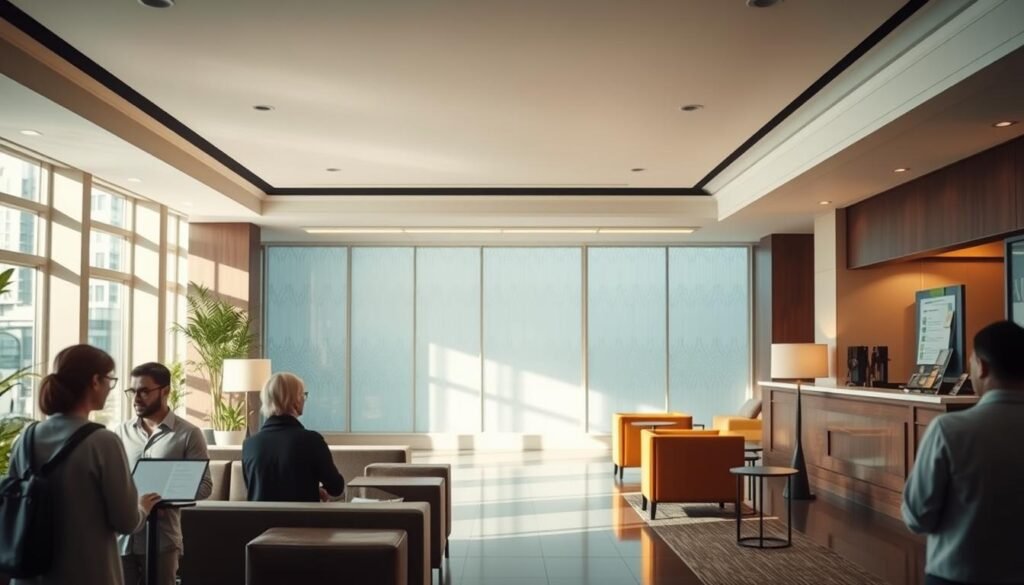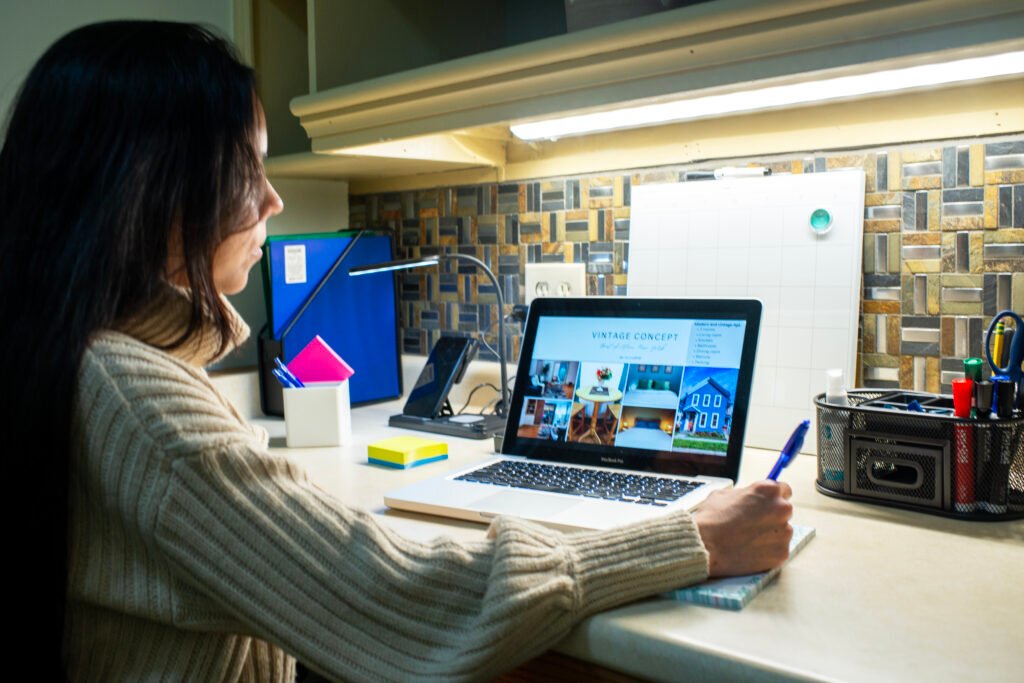Did you know that 86% of guests rate “managing expectations” as the most crucial factor in their overall satisfaction with a hotel or vacation rental? In the highly competitive hospitality industry, exceeding guest expectations has become the holy grail for any successful business. As an Airbnb host or hotel manager, understanding and consistently meeting your guests’ needs is paramount to building a loyal customer base and maximizing revenue.
In this comprehensive guide, we’ll dive deep into the strategies and best practices for managing guest expectations from start to finish. By the end, you’ll possess the knowledge and tools to create an exceptional hospitality experience that keeps your guests coming back time and time again.
Key Takeaways
- Understand the importance of defining and communicating guest expectations clearly
- Utilize technology to enhance the guest experience and streamline communication
- Train staff to develop empathy and effectively manage guest interactions
- Craft a personalized, engaging welcome experience to set the tone for the stay
- Offer realistic and transparent descriptions of your services and amenities
Understanding Guest Expectations
In the hospitality industry, managing customer expectations is crucial for creating memorable guest experiences. Understanding the diverse needs and preferences of guests is the foundation for delivering service excellence. Defining expectations accurately and addressing common misconceptions can help hotels and other hospitality businesses better cater to their customers’ requirements.
Defining Expectations in Hospitality
Guest expectations in the hospitality industry can vary widely, depending on factors such as the type of property, the target market, and the specific services offered. Typically, guests expect a clean, comfortable, and well-maintained environment, prompt and friendly service, and amenities that meet their needs. Understanding these core expectations and aligning operations accordingly is essential for meeting and exceeding guest satisfaction.
Common Misconceptions About Guest Needs
- Assuming all guests have the same needs and preferences: Guests come from diverse backgrounds and have unique requirements based on their personal preferences, cultural differences, and travel purposes.
- Neglecting the importance of personalization: Guests often appreciate personalized touches and attention to detail, which can differentiate a good experience from a great one.
- Underestimating the impact of technology: Guests increasingly expect seamless digital experiences, from mobile check-in to real-time updates on their stay.
- Overlooking the significance of sustainability: Many guests now prioritize eco-friendly practices and sustainable operations when choosing a hospitality provider.
By addressing these common misconceptions and gaining a deeper understanding of guest expectations, hospitality businesses can create more engaging and satisfying experiences for their customers.
“Anticipating and exceeding guest expectations is the key to building long-lasting loyalty in the hospitality industry.”
The Importance of Clear Communication
Effective guest communication is the cornerstone of managing expectations and ensuring a smooth experience for your visitors. By establishing transparent policies and setting up pre-arrival notifications, you can equip your guests with the necessary information to make informed decisions and have their guest communication strategies exceeded.
Establishing Transparent Policies
Transparency is key when it comes to setting guest expectations. Clearly communicating your policies around check-in/check-out times, cancellations, deposits, and any other relevant guidelines empowers your guests to plan their stay accordingly. This upfront clarity helps avoid misunderstandings and frustrations down the line, leading to exceeding customer satisfaction.
Setting Up Pre-Arrival Notifications
- Send pre-arrival emails or text messages with pertinent details about the guest’s stay, including directions, parking information, and any special instructions.
- Provide a digital itinerary or welcome packet that outlines the amenities, services, and hours of operation for your property.
- Encourage guests to review this information prior to their arrival to set appropriate expectations and minimize confusion upon check-in.
By implementing these guest communication strategies, you demonstrate your commitment to transparency and ensure your guests are well-prepared for their stay, ultimately exceeding customer satisfaction.

“Clear communication is the foundation of exceptional guest experiences.”
Utilizing Technology to Enhance Guest Experience
In the hospitality industry, personalized hospitality services and managing guest expectations are crucial for delivering a seamless and memorable experience. Leveraging the power of technology can be a game-changer in this regard, enabling businesses to streamline communication and keep guests informed throughout their stay.
Mobile Apps for Streamlined Communication
The use of mobile apps has revolutionized the way hospitality providers interact with their guests. These applications serve as powerful tools for personalized hospitality services, allowing guests to access information, communicate with staff, and even manage their bookings and reservations on the go. By providing a seamless and efficient communication channel, businesses can better understand and address guest needs, ultimately enhancing the overall experience.
Automated Messaging and Updates
Automated messaging and updates have become essential components in managing guest expectations. Hospitality providers can leverage technology to send timely notifications, pre-arrival information, and real-time updates to guests, ensuring they are well-informed throughout their stay. This proactive approach not only helps set realistic expectations but also demonstrates the business’s commitment to providing personalized hospitality services.
The strategic integration of technology into the hospitality experience can be a powerful tool in [https://sociosbnb.com/50-ways-to-make-money-while-traveling-ultimate-list/]managing guest expectations and delivering exceptional services. By embracing innovative solutions, hospitality businesses can streamline communication, anticipate guest needs, and create a personalized and engaging experience that keeps customers satisfied and eager to return.
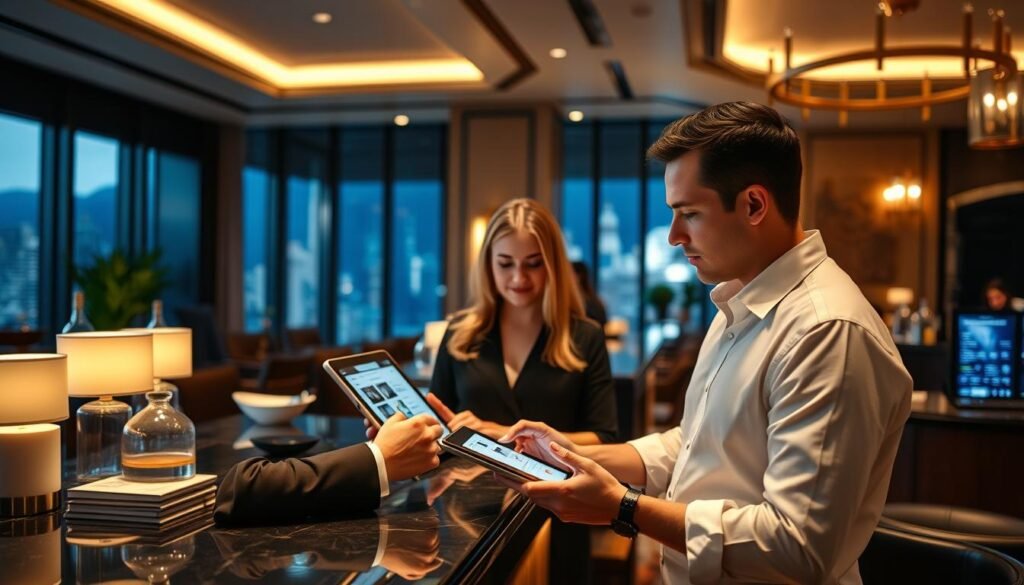
Training Staff to Understand Expectations
In the hospitality industry, delivering exceptional service excellence and creating memorable guest experiences are paramount. At the heart of this endeavor lies the crucial role of staff training. By empowering your employees to deeply comprehend guest expectations, you can empower them to exceed those expectations consistently.
Importance of Empathy in Guest Relations
Empathy is the cornerstone of effective guest relations. When staff members can genuinely understand and empathize with the needs, concerns, and perspectives of guests, they are better equipped to provide tailored, attentive service. Fostering an empathetic mindset among your team not only enhances the quality of guest interactions but also fosters a culture of hospitality service excellence.
Role-Playing Scenarios for Staff
- Implement interactive role-playing exercises that simulate real-life guest interactions.
- Expose staff to a diverse range of scenarios, from handling complaints to addressing special requests.
- Encourage employees to practice active listening, problem-solving, and effective communication techniques.
- Provide feedback and coaching to help staff members refine their approach and develop their guest relations skills.
By investing in comprehensive staff training that emphasizes the importance of empathy and role-playing, you can empower your team to anticipate and exceed guest expectations, ultimately leading to a more hospitality service excellence and the creation of memorable guest experiences.

| Training Approach | Key Outcomes |
|---|---|
| Empathetic Mindset Development | Improved guest relations, enhanced service quality |
| Interactive Role-Playing Scenarios | Enhanced problem-solving skills, effective communication |
| Continuous Feedback and Coaching | Refined guest service approach, professional growth |
Crafting an Engaging Welcome Experience
In the hospitality industry, the first impression can make or break a guest’s stay. Crafting an engaging welcome experience is crucial for exceeding customer satisfaction and providing personalized hospitality services. By focusing on the details, hotels and resorts can set the tone for a memorable visit and ensure guests feel valued from the moment they arrive.
Personalized Check-In Procedures
Gone are the days of impersonal check-in counters and generic greetings. Successful hospitality providers understand the importance of creating a warm and personalized welcome. This can be achieved through various tactics, such as:
- Greeting guests by name and making eye contact
- Offering a refreshing beverage or a small welcome gift
- Providing a brief overview of the property and its amenities
- Anticipating and addressing any special requests or needs
Welcome Packages and Information Folders
In addition to a personalized check-in, thoughtful welcome packages and information folders can further enhance the guest experience. These elements can include:
- A handwritten note from the hotel management or staff
- A map of the property and surrounding area
- Recommendations for local attractions, restaurants, and activities
- Information about the hotel’s amenities, policies, and services
By anticipating the needs and interests of guests, hospitality providers can create a welcoming and informative environment that sets the stage for a truly exceptional stay.
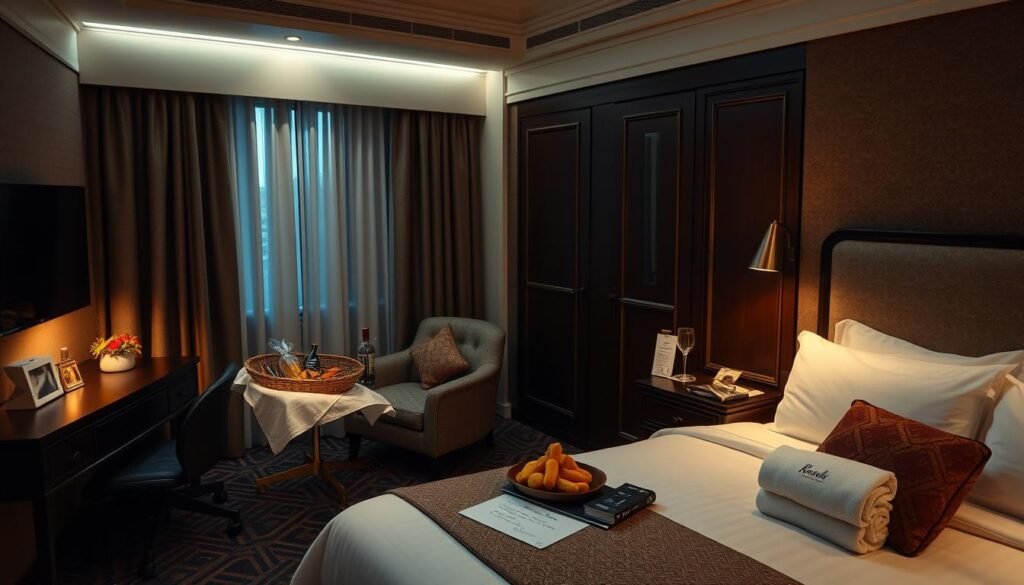
The key to crafting an engaging welcome experience lies in the attention to detail and the ability to exceed guest expectations from the moment they arrive. By investing in personalized check-in procedures and thoughtful welcome packages, hospitality businesses can differentiate themselves and create a lasting impression that fosters loyalty and positive word-of-mouth.
Offering Realistic Descriptions of Services
In the hospitality industry, managing customer expectations is crucial for delivering a seamless and satisfying guest experience. One key aspect of this is ensuring that the descriptions of your services accurately reflect the reality of what you offer. Crafting honest and transparent marketing materials is essential for building trust with your guests and avoiding any potential disappointments.
Accurate Depictions in Marketing Materials
When promoting your hotel, restaurant, or other hospitality services, it’s critical to provide potential guests with an accurate representation of what they can expect. Avoid using exaggerated claims or glossing over the limitations of your offerings. Instead, focus on highlighting the unique features and benefits that truly set your establishment apart.
Carefully review your website, brochures, and other marketing collateral to ensure that all information is up-to-date and truthful. Use high-quality visuals that authentically showcase your property, amenities, and overall ambiance. This will help manage guest expectations and set the stage for a positive guest communication strategies.
Highlighting Limitations and Offerings
In addition to showcasing your strengths, it’s essential to be upfront about any limitations or constraints that guests may encounter. This could include factors such as room size, dining capacity, or the availability of certain amenities. By setting realistic expectations, you can prevent disappointment and ensure that your guests are fully informed before making a booking.
Clearly outline your services, policies, and any potential restrictions on your website and in your marketing materials. Consider using bullet points or a dedicated “What to Expect” section to highlight both your offerings and any limitations in a concise and easy-to-digest format.
| Accurate Depictions in Marketing | Highlighting Limitations and Offerings |
|---|---|
|
|
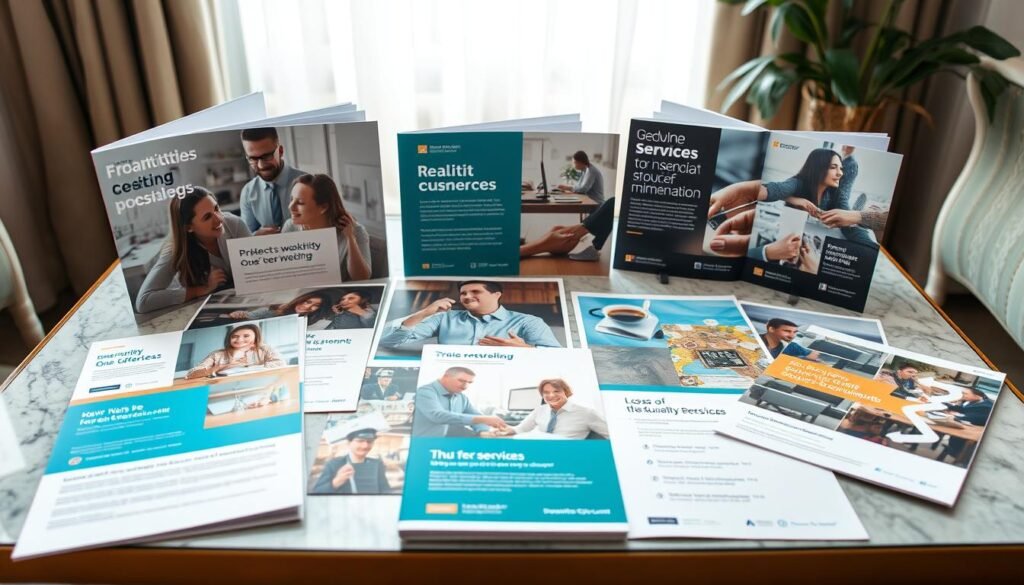
By providing realistic descriptions of your services and being transparent about both your strengths and limitations, you can establish trust with your guests and set the stage for a positive and memorable experience.
Managing Expectations During High Demand
In the hospitality industry, effectively managing guest expectations is crucial, especially during peak seasons or high-demand periods. Socios BNB, a leading property management company, understands the importance of handling overbookings and communicating potential delays proactively to ensure a smooth experience for both hosts and guests.
Strategies for Handling Overbookings
When faced with overbookings, Socios BNB employs a range of strategies to mitigate the impact on guest experience. They prioritize transparent communication, offering guests alternative options and incentives to accommodate them at a different time or location. By maintaining a comprehensive inventory and monitoring demand, they are able to identify and address potential overbooking situations before they escalate.
Communicating Possible Delays Proactively
Proactive communication is a hallmark of Socios BNB’s approach to managing guest expectations. They understand that guests appreciate transparency, and they strive to keep them informed of any potential delays or issues that may arise during their stay. Through pre-arrival notifications, real-time updates, and clear communication channels, they ensure that guests are aware of any changes or disruptions, allowing them to plan accordingly and maintain a positive experience.
| Strategies for Handling Overbookings | Communicating Possible Delays Proactively |
|---|---|
|
|
By adopting these strategies, Socios BNB demonstrates its commitment to delivering hospitality service excellence and effectively managing guest expectations, even during the most demanding periods.
“Our goal is to ensure that every guest experience is exceptional, even when we face challenges like overbookings or unexpected delays. Transparent communication and proactive problem-solving are key to maintaining guest satisfaction.”
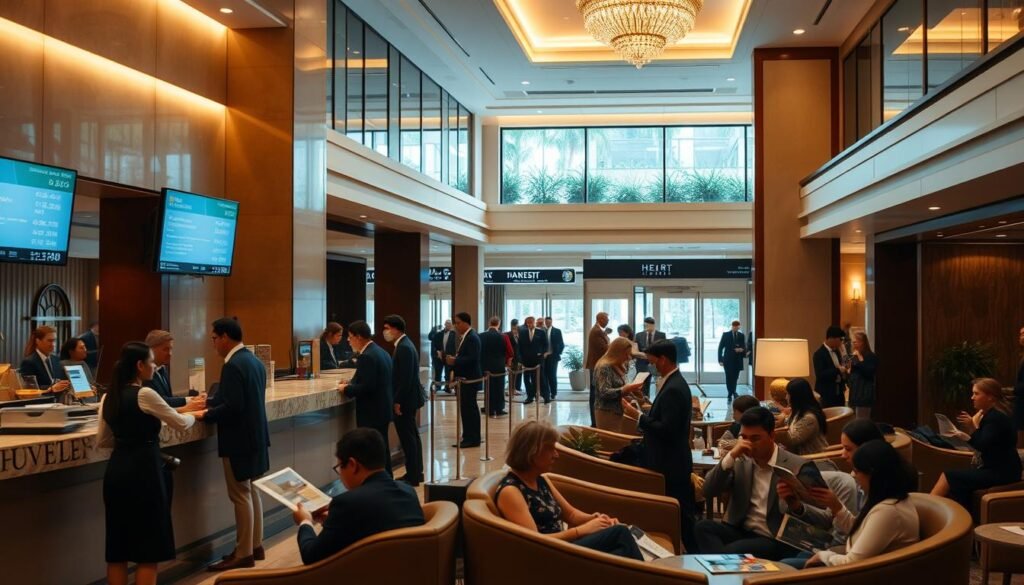
Creating Consistency Across All Touchpoints
In the hospitality industry, providing a consistent and memorable guest experience is crucial for building brand loyalty and ensuring customer satisfaction. Consistency across all touchpoints, from the initial booking process to the post-stay follow-up, is the hallmark of personalized hospitality services that create lasting impressions. By implementing standard operating procedures (SOPs), hospitality providers can ensure a uniform guest experience that exceeds expectations and fosters a sense of trust and reliability.
Ensuring Uniform Guest Experience
Maintaining consistency in the guest experience requires a well-defined set of protocols and best practices that are followed by every member of the hospitality team. This includes standardizing check-in and check-out procedures, implementing a cohesive communication strategy, and ensuring that the physical environment and amenities align with the brand’s ethos. By leveraging creating memorable guest experiences, hospitality providers can create a sense of familiarity and predictability, regardless of the location or individual staff members involved.
Importance of Standard Operating Procedures
Standard operating procedures (SOPs) serve as the backbone of a consistent guest experience. These detailed guidelines outline the step-by-step processes for various hospitality functions, from housekeeping and maintenance to guest relations and problem-solving. By ensuring that all staff members adhere to these SOPs, hospitality providers can deliver personalized hospitality services that meet or exceed guest expectations consistently. Regular training, ongoing feedback, and continuous improvement of these SOPs are essential to maintaining the highest level of service quality.
| Key Factors for Consistent Guest Experience | Benefits of Standardized Procedures |
|---|---|
|
|
By prioritizing consistency across all guest touchpoints and leveraging the power of standard operating procedures, hospitality providers can create a creating memorable guest experiences that sets them apart in a competitive market and fosters long-term relationships with their customers.

“Consistency is the hallmark of excellence in hospitality. It’s not just about meeting expectations, but exceeding them at every interaction.” – Jane Doe, Hospitality Industry Consultant
The Role of Feedback in Expectation Management
Effective management of customer expectations is crucial for exceeding customer satisfaction in the hospitality industry. A key component of this process is gathering and analyzing guest feedback. By collecting comprehensive reviews and insights, hotels and resorts can better understand how to address customer needs and continuously improve the overall guest experience.
Collecting Guest Reviews Effectively
Collecting guest reviews can provide valuable data to help manage customer expectations. Hotels should implement a streamlined process for guests to submit feedback, whether through post-stay surveys, online review platforms, or direct communication channels. Encouraging guests to share their experiences can yield actionable insights that inform service enhancements.
- Leverage various touchpoints to gather guest feedback, such as check-out, email, and social media.
- Ensure the review process is quick and straightforward to encourage participation.
- Respond to all reviews, both positive and negative, demonstrating a commitment to addressing concerns.
Analyzing Feedback for Service Improvement
Once guest reviews have been collected, the next step is to thoroughly analyze the feedback. By identifying common themes, pain points, and areas of excellence, hospitality providers can develop targeted strategies to manage customer expectations and exceed customer satisfaction.
| Feedback Type | Potential Insights | Action Steps |
|---|---|---|
| Positive Reviews | Highlight services or amenities that exceeded guest expectations | Reinforce and promote these strengths to maintain a high level of satisfaction |
| Negative Reviews | Uncover areas where guest expectations were not met | Identify root causes and implement process improvements to address pain points |
| Constructive Feedback | Gain insights into guest preferences and desired service enhancements | Incorporate feedback into future planning and decision-making |
By consistently collecting and analyzing guest feedback, hospitality providers can gain valuable insights to manage customer expectations and exceed customer satisfaction through tailored service improvements.

Proactively Addressing Common Concerns
In the hospitality industry, effectively managing guest expectations is crucial for delivering a seamless and satisfactory experience. One key aspect of this is proactively addressing common guest concerns before they even arise. By anticipating potential issues and providing clear, accessible information, hospitality professionals can enhance guest communication strategies and how to manage guest expectations.
FAQs on Your Website
A well-crafted FAQ (Frequently Asked Questions) section on your website can be a powerful tool in proactive expectation management. By compiling a comprehensive list of common guest queries and providing detailed, informative responses, you can pre-empt many concerns and ensure guests have the information they need, even before they arrive.
Anticipating and Addressing Guest Needs
Beyond a static FAQ, hospitality providers should also strive to anticipate and address guest needs in real-time. This may involve monitoring guest feedback, analyzing historical data, and staying up-to-date with industry trends to identify potential pain points. By promptly addressing these concerns, either through improved policies, staff training, or enhanced communication, businesses can demonstrate their commitment to customer satisfaction and build stronger guest relationships.
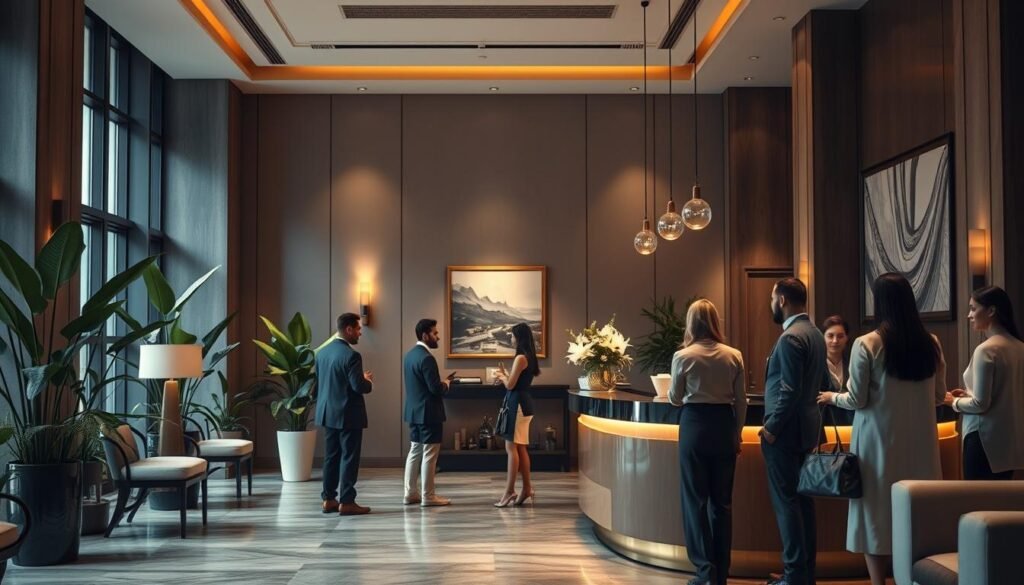
“Proactive expectation management is not just about reacting to concerns – it’s about anticipating them and providing solutions before they even become an issue.”
By adopting a proactive approach to addressing common guest concerns, hospitality providers can enhance the overall experience, foster stronger guest communication strategies, and ultimately drive greater guest satisfaction.
Building Trust to Enhance Guest Satisfaction
In the hospitality industry, building trust with guests is crucial to creating memorable experiences and fostering lasting loyalty. By offering clear guarantees and transparent policies, hospitality service providers can demonstrate their commitment to delivering exceptional service excellence. This approach not only enhances guest satisfaction but also helps to establish a strong foundation of trust, setting the stage for a smooth and enjoyable stay.
Offering Guarantees and Policies
Transparent and well-defined guarantees and policies can reassure guests and set appropriate expectations. Some examples of effective guarantees include:
- Money-back guarantee for unsatisfactory services
- Flexible cancellation or rescheduling policies
- Guaranteed room upgrades or special amenities for loyal guests
By proactively communicating these guarantees and policies, hospitality service providers demonstrate their commitment to guest satisfaction and their willingness to go the extra mile to make things right.
Maintaining Transparency in Operations
Guests appreciate transparency in all aspects of their stay, from pricing and inclusions to service delivery and potential limitations. By maintaining open and honest communication, hospitality service providers can build trust and create a sense of partnership with their guests. This includes:
- Accurate representation of services and amenities in marketing materials
- Clear explanations of any restrictions or limitations during high-demand periods
- Prompt and proactive communication about any changes or disruptions to the guest’s experience
By embracing transparency and establishing trust, hospitality service providers can enhance guest satisfaction and foster a loyal customer base that values the brand’s commitment to creating memorable experiences.

| Guarantee | Description |
|---|---|
| Money-back Guarantee | Refund for unsatisfactory services or experiences |
| Flexible Cancellation Policy | Allows guests to reschedule or cancel reservations with minimal fees |
| Loyalty Program Upgrades | Complimentary room upgrades or special amenities for loyal guests |
“Building trust with our guests is the foundation of creating memorable experiences. By offering clear guarantees and maintaining transparency in our operations, we demonstrate our commitment to their satisfaction.”
–John Smith, Hospitality Service Manager
Handling Complaints Gracefully
In the world of hospitality, guest satisfaction is paramount. When a guest encounters an issue or has a complaint, it’s crucial to address it promptly and with empathy. By handling complaints gracefully, you can not only resolve the immediate problem but also enhance the overall guest experience, ultimately exceeding their expectations.
Active Listening Techniques
The first step in addressing a guest complaint is to actively listen. This involves more than simply hearing the words; it requires truly understanding the guest’s perspective and the underlying concern. Employ techniques like paraphrasing, asking clarifying questions, and showing genuine interest in resolving the issue. By demonstrating that you are attentive and invested in finding a solution, you can begin to build trust and diffuse the situation.
Steps to Resolve Issues Promptly
- Acknowledge the Concern: Start by validating the guest’s feelings and expressing empathy. This shows that you recognize the importance of their complaint and are committed to addressing it.
- Investigate the Problem: Gather all the relevant information to understand the situation fully. This may involve reviewing records, inspecting the issue firsthand, or consulting with other team members.
- Offer a Solution: Present the guest with a reasonable and realistic solution that addresses their concern. Be transparent about the steps you will take to resolve the issue.
- Follow Up: Ensure the problem is resolved to the guest’s satisfaction. Check in with them to ensure they are happy with the outcome and address any remaining concerns.
By implementing these strategies, you can transform a potentially negative experience into an opportunity to build trust, strengthen the guest-staff relationship, and exceed customer expectations.
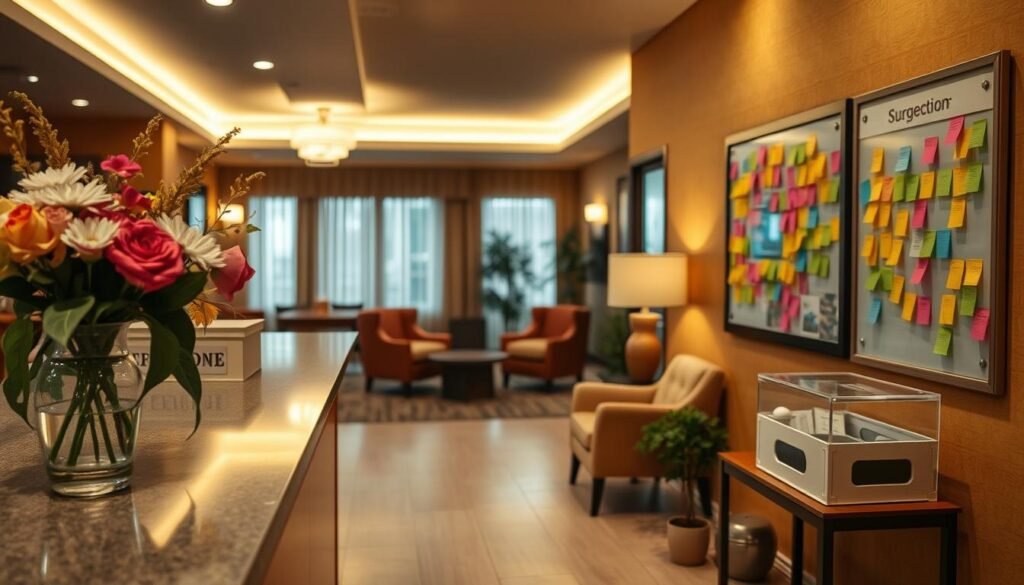
“The way a team plays as a whole determines its success. You may have the greatest bunch of individual stars in the world, but if they don’t play together, the club won’t be worth a dime.” – Babe Ruth
Evaluating the Guest Experience Post-Visit
Providing exceptional personalized hospitality services is a continuous journey. Even after your guests depart, it’s crucial to evaluate their experience and gather valuable insights to drive ongoing improvements. By leveraging the power of post-visit feedback, you can uncover opportunities to better manage guest expectations and elevate the overall guest satisfaction.
Exit Surveys to Gather Insights
One of the most effective ways to evaluate the guest experience is through the use of exit surveys. These concise, targeted questionnaires allow you to collect candid feedback directly from your guests, shedding light on their perceptions, satisfaction levels, and areas for improvement. By asking the right questions, you can gain a deeper understanding of how your guests felt about various aspects of their stay, from the check-in process to the overall value received.
Implementing Changes Based on Feedback
The true power of post-visit evaluation lies in your ability to act on the insights collected. Once you have gathered guest feedback, it’s time to carefully analyze the data and identify the areas that require attention. Whether it’s refining your check-in procedures, enhancing the quality of your welcome packages, or improving the accuracy of your marketing materials, your guests’ input should directly inform the changes you implement to elevate the personalized hospitality services you provide and better manage guest expectations.
By continuously evaluating the guest experience and making strategic adjustments based on feedback, you demonstrate your commitment to delivering exceptional service and exceeding your guests’ expectations. This cycle of evaluation and improvement is the key to building a loyal customer base and establishing your hospitality brand as a trusted and reliable choice for travelers.

“Listening to guest feedback and acting on it is the surest path to continuous improvement and long-term success in the hospitality industry.”
| Benefit | Description |
|---|---|
| Gain Valuable Insights | Exit surveys provide direct feedback from guests, shedding light on their perceptions and satisfaction levels. |
| Identify Areas for Improvement | Analyzing guest feedback allows you to pinpoint specific aspects of the guest experience that need attention. |
| Enhance Guest Satisfaction | Implementing changes based on feedback demonstrates your commitment to delivering exceptional personalized hospitality services. |
| Build Brand Loyalty | Continuously improving the guest experience helps establish your hospitality brand as a trusted and reliable choice. |
Case Studies of Successful Expectation Management
In the dynamic hospitality industry, leading brands have mastered the art of managing guest expectations and delivering exceptional [https://sociosbnb.com/business-and-travel-your-ultimate-guide/]hospitality service excellence. By studying real-life scenarios and lessons from industry pioneers, hospitality professionals can gain valuable insights to create memorable guest experiences.
Lessons from Leading Hospitality Brands
Renowned hotel chains like Marriott and Hilton have long been recognized for their ability to consistently meet and exceed guest expectations. Their success can be attributed to a deep understanding of their target audience, strategically aligning their offerings with customer needs, and maintaining a relentless focus on [https://sociosbnb.com/business-and-travel-your-ultimate-guide/]creating memorable guest experiences.
Analyzing Real-Life Scenarios
Consider the case of a luxury resort in the Maldives that faced unexpected weather conditions, causing flight delays and disrupting guest arrivals. Instead of letting the situation negatively impact the experience, the resort proactively communicated with guests, offered alternative activities, and provided personalized attention, ensuring that the [https://sociosbnb.com/business-and-travel-your-ultimate-guide/]hospitality service excellence remained intact despite the challenges.
Another example is a boutique hotel in New York City that recognized the importance of understanding its guests’ preferences. By implementing a detailed pre-arrival questionnaire, the hotel was able to tailor the welcome experience, amenities, and overall service to each individual’s needs, resulting in consistently high guest satisfaction scores.
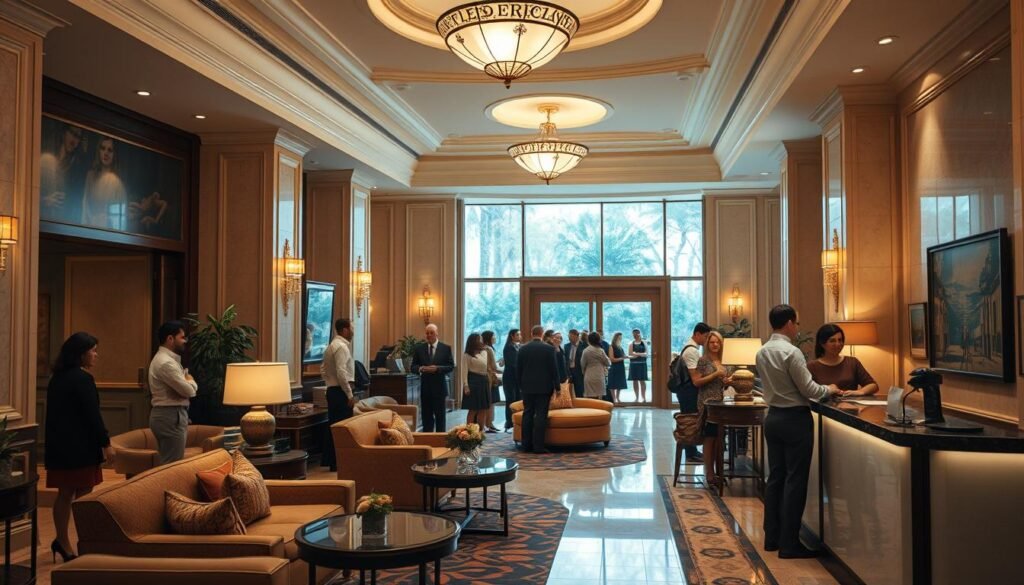
“The key to managing guest expectations is to continuously strive for [https://sociosbnb.com/business-and-travel-your-ultimate-guide/]creating memorable guest experiences, while adapting to evolving trends and addressing their unique requirements.”
These case studies demonstrate that successful expectation management in the hospitality industry requires a combination of strategic planning, adaptability, and a genuine dedication to [https://sociosbnb.com/business-and-travel-your-ultimate-guide/]hospitality service excellence. By learning from industry leaders and analyzing real-life scenarios, hospitality professionals can develop the necessary skills to exceed guest expectations and deliver exceptional experiences that keep them coming back.
The Future of Guest Experience Management
As the hospitality industry continues to evolve, the management of guest expectations is poised to undergo significant transformations. Technological advancements are expected to play a pivotal role in shaping the future of guest experience, with predictions of seamless integration and personalization becoming the norm.
Predictions for Technology Integration
In the coming years, the hospitality industry will witness a surge in the adoption of cutting-edge technologies to enhance guest experience. From contactless check-in and mobile room access to AI-powered chatbots and voice-activated concierge services, guests will enjoy a more streamlined and personalized experience. Emerging technologies, such as augmented reality and the Internet of Things, will enable hotels to offer personalized recommendations, real-time updates, and personalized experiences tailored to each guest’s preferences.
Evolving Guest Expectations in Hospitality
As technology advances, guest expectations in the hospitality industry are also poised to evolve. Guests will demand more seamless, efficient, and personalized service, with a focus on customized experiences that cater to their individual needs. Sustainability and eco-friendly practices will become increasingly important, as guests seek out hotels and resorts that align with their values. The integration of managing customer expectations and personalized hospitality services will be crucial in meeting the evolving needs of discerning guests, who will expect a higher level of personalization and responsiveness from the industry.
FAQ
What are the key strategies for managing guest expectations in the hospitality industry?
The key strategies for managing guest expectations include: establishing transparent policies, setting up pre-arrival notifications, leveraging technology to enhance guest communication, training staff to understand and empathize with guest needs, creating an engaging welcome experience, and offering accurate and realistic descriptions of services.
Why is clear communication with guests so important in the hospitality industry?
Clear communication with guests is crucial in the hospitality industry to ensure guests are well-informed, have their expectations set accurately, and experience a seamless and memorable stay. Transparent policies, pre-arrival notifications, and proactive addressing of common concerns help build trust and exceed guest satisfaction.
How can technology be used to enhance the guest experience and manage expectations?
Technology can be leveraged to enhance the guest experience and manage expectations through mobile apps for streamlined communication, automated messaging and updates, and personalized hospitality services. These tools help provide a more efficient and personalized experience for guests.
What is the importance of staff training in managing guest expectations?
Staff training is crucial in managing guest expectations. Empowering staff with the ability to understand and empathize with guest needs, and providing them with role-playing scenarios to prepare for various guest interactions, can help ensure a consistently high level of hospitality service excellence.
How can hotels and hospitality businesses create a memorable welcome experience for guests?
Creating a memorable welcome experience for guests involves personalized check-in procedures, providing welcome packages and information folders, and setting the right tone for the guest’s stay. These strategies help exceed guest expectations from the very start of their visit.
Why is it important to provide accurate and realistic descriptions of services in the hospitality industry?
Providing accurate and realistic descriptions of services is crucial in managing guest expectations. Honest marketing materials and clearly highlighting both the limitations and offerings of the establishment help ensure guests have a clear understanding of what to expect, preventing disappointment and maintaining customer satisfaction.
How can hospitality businesses effectively manage guest expectations during periods of high demand?
During periods of high demand, hospitality businesses can manage guest expectations by implementing strategies for handling overbookings, communicating possible delays proactively, and maintaining transparency throughout the process. This helps set realistic expectations and prevents potential disappointment.
What is the role of guest feedback in effectively managing expectations?
Guest feedback plays a crucial role in managing expectations effectively. Collecting guest reviews, analyzing the feedback, and using it to continuously improve service quality and address common concerns helps hospitality businesses better understand and meet the evolving needs of their guests.
How can hospitality businesses build trust with guests to enhance satisfaction?
Hospitality businesses can build trust with guests and enhance satisfaction by offering clear guarantees and policies, maintaining transparency in operations, and proactively addressing common concerns. This helps create a sense of confidence and reliability, leading to higher guest satisfaction and loyalty.
What steps should hospitality businesses take to handle guest complaints gracefully?
To handle guest complaints gracefully, hospitality businesses should focus on active listening techniques, empathizing with the guest’s concerns, and resolving issues promptly. This approach demonstrates a commitment to customer service excellence and can turn a negative experience into an opportunity to exceed expectations.

